Allison Jones is a community partner and friend of United who has participated in numerous events and programming at the seminary, including Arts Lunch, Social Transformation events, and Queertopia United. She is a long time musician and emerging artist with a passion for social justice, education, and public health. She currently works in the education department at JustUs Health in Saint Paul. I sat down with Allison Jones last Friday Nov. 13 to interview her about her experience being a community partner with United.
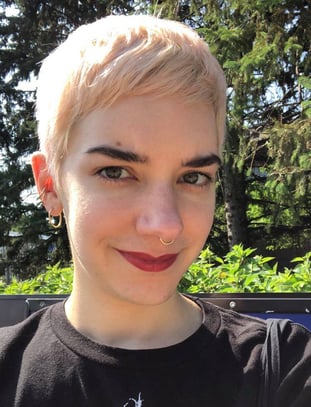
Hi Allison, it's great to talk with you! To begin how would you describe your relationship to United Theological Seminary of the Twin Cities?
AJ: I am the roommate of a United graduate, so that was my introduction to United. I really have no theology back ground or a religious tradition that I actively participate in. But I started going to community events and following their social media presence and found that I care about a lot of the same stuff that United is focusing on. I think of myself as a United community member at large. I come to events like arts lunch, and I’ve found an artist community there. I go to a lot of their public lectures and am kind of a cheer leader for the good work that United is doing.
Awesome! And when you're not with us at United, what else are you up to?
AJ: I work at JustUs Health, which is a public health agency in the Twin Cities that serves Minnesota. I am in the education department. I am working primarily on curricula for healthcare professionals to help them be more aware of LGBTQ issues and help them serve their LGBTQ patients and clients better, and also make sure that people are updated on the latest information about HIV prevention and treatment. So that’s my dad job.
I am also working on building an artistic practice, with visual arts, and working on trying to make that more of a community thing instead of just something I do in my room. Eventually, hopefully I will be an emerging artist whose work you can actually see somewhere, so stay tuned!
And you also do a lot with music, correct?
AJ: Yes! I am also a lifelong musician. I don’t perform a lot, but I do like to every now and then. I have also been involved in theatre or had theatre in my orbit for much of my life.
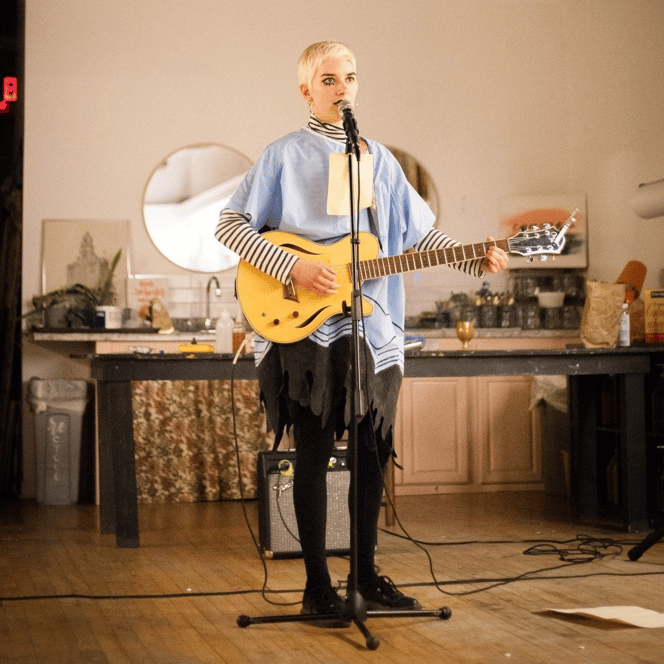 Allison Jones performing in Rochester, MN, 2019.
Allison Jones performing in Rochester, MN, 2019.
So, digging a little deeper, since Covid, you have been a regular participant in United's Zoom Arts Lunches. Can you talk a little about that?
AJ: Arts Lunch is a weekly meeting for United students, faculty, staff and community members. Each week has a different topic led by a volunteer. Sometimes it’s a look into a specific artist. Sometimes it is making art together. Sometimes it’s like a show and tell or a listening party. It can take a lot of different forms.
Personally, it has helped me loosen up and experiment with different media, for instance I went to a poetry themed one—and I NEVER write poetry—but it got me writing some poems. It exercises parts of my brain that I normally don’t use. It’s obviously an educational experience, and the most important thing about it for me is that I have gotten to meet some really cool people and learn about art that other people are making and have a place to bounce ideas off of people or do a presentation in a low stakes environment.
You mentioned "listening parties," which I believe is something you introduced to the group. Can you tell us a little more about that?
AJ: Sure! For a listening party, everybody brings a song or a couple of songs of their choice, either based on a theme or something they’ve been vibing on, and we listen to it together. Sometimes there’s a little bit of commentary, but the main point is to really spend time with the music. It stared because I had been listening to a lot more new music or music that is new to me during COVID times as a kind of spiritual or contemplative practice. When I listen to music, it’s like a meditative process. It helps me get out of my own head. So instead of just listening on my own, I thought I'd share the process with a community.
You have a really strong connection to music, both as a listener and as a singer?
AJ: What I like about music is that it conveys things you can’t necessarily convey with words or images. The way I emotionally connect with music is not usually something I can articulate. That is the kind of connection I can see with the divine or spiritual practices. I use music to try and access parts of myself and of the community that transcend words. As a long time choral singer that’s probably the closest I’ve felt to having a religious community and learning about the history of western music born out of Church context. So the choirs that I’ve been in are part of this long tradition of composers trying to make something beautiful enough to convey the majesty of God they were feeling. When I am singing with other people, I can connect to that larger-than-myself kind of feeling. I can see what these super religious dudes way back in the early music days were doing, and I am connecting with them in this experience. And also like Hildegarde of Bingen–not just “dudes”–but some really amazing women, many of whom have probably been lost to history.
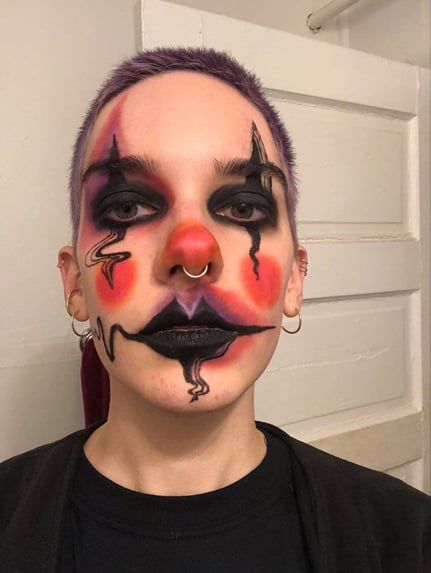
Influenced by psychedelia, Allison Jones is particularly interested in the artform of make up.
Switching gears a little bit, you are also a participant in United's queer learning and support group, Queertopia United. How have you found community in this somewhat more academic space?
AJ: Queertopia has been really wonderful! It’s sort of a cross between a book club and a class, and it’s free, and you don’t have to be enrolled in the school. I say all the time, I’m like “grifting” United out of an education, and this is a great example of that. It’s led by alum Max Brumberg-Kraus and current student Stephani Pescitelli. Basically, we meet regularly to talk about queer theory in the context of theology and the kinds of professions United students are going into like chaplaincy or spiritual care. But it’s just a volunteer group of people who all care about this stuff to talk about it.
Why did you get involved with the Queertopia United?
AJ: I graduated undergrad a little over four years ago, and I’d finally gotten the itch to get back into learning, reading, and engaging in theory. And this is a way that feels lower stakes to get into that practice again. We’ve been reading some really amazing seminal queer theory pieces and some that are more explicitly theological. And it’s just been wonderful. I mean we engage with kind of challenging ideas, on one hand taking an academic approach to these texts but there’s also a really big community component. I feel pretty similarly about it as I do about arts lunch, if not even more strongly connected to my Queertopia United comrades, because we get into some pretty personal stuff. In my undergrad, I studied Critical Identity Studies and Sociology, which are both disciplines where people bring a lot of their personal experiences into the classroom. But in undergrad, I never really hit on the same sort of “realness” that we are reaching in Queertopia. We are unearthing–I am unearthing truths about myself and about the world that are so helpful to take into my world even though I am not very religious or a spiritual care provider.
What are you all reading right now?
AJ: Right now, the text I am in the middle of is Time Binds by Elizabeth Freeman. It’s about queer temporality, or the ways that we as humans have structured or kept track of time and how that can uphold heteronormativity or patriarchy as well as capitalism. What’s cool about it and another book we read, Queer Phenomenology by Sarah Ahmed, is that both books are turning the camera onto these really foundational structures of our society: time, in this book, and then, for Sarah Ahmed, physical space. These are things we don’t really think about, things that are just part of regular every day life that we don’t look at, and these thinkers are pointing out how time and space are ushering us into certain life paths. Feeling dissonance with the very world itself doesn’t necessarily mean that you are out of place; it can often mean that the world is, in very fundamental ways, structured in ways so that not everybody is at home in it. Talking about that in the context of queerness with other queer people is really important and special because we can say “Oh, you feel that too!” or “you’re experiencing this too!”
How do you see participation in this group affecting your life outside of United?
AJ: I am sure there are many ways that the things we are reading are going to impact my work very directly, since I am working with LGBTQ populations. However, right now, it's showing up the most in my personal life by addressing my own emotional turmoil. Something I have been struggling these last few years as a recent and not so recent college graduate is trying to "figure out" my life. I have been trying to follow career paths that I think will give me a certain amount of normalcy in my life, and I have been reaching toward certain goals that more and more I am realizing are not things I actually want but that I am more trying to fit myself into this mold in society. Reading these books has helped me understand why that is not satisfying. It might not immediately be obvious the tie to queerness, but it’s shown me how many of the class signifiers I was reaching for are inextricably tied to signifiers of heterosexuality. For instance, getting married and owning a home are supposed to be markers of success in the same way that having an office 9-5 job, and then the people at the 9-5 job always talk about their heterosexual lives, and they sort of feed into each other. I was just feeling out of place in that system but didn’t have words to express it, because it is something that is so fundamental to living in this world. That’s how I am applying the readings. They’re showing me some of the restrictions that I have placed on me or that the world has placed on me, and they’re starting to give me the kind of tools to lift those restrictions from myself.
Wow, that is really amazing. As you speak about your experience with the readings, I am thinking about the United student body. Many students come from all these different backgrounds having felt a call to a fairly non-traditional line of work. Many students are changing their careers or are pursuing innovative work in the arts or social justice in ways that also don't necessarily follow traditional or "normal" paths.
AJ: Totally. One of the most important things I’ve found in the United community are just the people who go there or who are staff and faculty, who come from all these different walks of life and different ages. It’s a very multigenerational student body, which is not something I was used to coming first from college and then AmeriCorps with a bunch of other “young professionals.” I found so much value in getting to know people who are taking less traditional life paths. And realizing you can be 50, 60, 70 and decide to change your career. Just meeting people who are really going for it and deciding to do something in their life that they really care about is really exciting. And it’s not just meeting one person who is doing that but having a whole community of people in that space is really rare and magical.
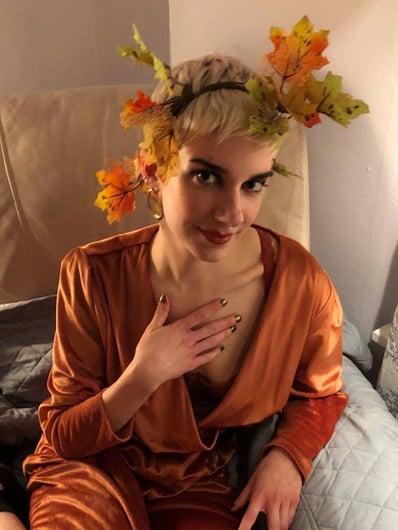
Any final thoughts?
AJ: Just this. I grew up in an atheist context, and I was suspicious of religion in general. I have later realized that when I would speak of religion I was really speaking about Christianity. So I had this suspicion of religiously, and especially Christian, affiliated spaces. This is to say, United is not the sort of space I would normally just stumble across. But I was very pleasantly surprised to see that when I would go to a lecture or something like that, the audience had a lot of people like me in it. AND there were a lot of people who were not like me who came from all kinds of different religious traditions. I’ve learned you can get a lot out of considering theological questions, whether or not you would normally frame things that way. These sorts of questions offer so much more than just “talking about God,” because when we talk about God, we are talking about the world as well. So United has given me an additional framework and tool to think about really big questions that before I joined the United community I shied away from. These questions have enriched my work and life and emotional wellbeing. On top of that, everyone has welcomed me into this community. It doesn’t matter to anybody, except me in my early days being at United, that I am not enrolled as a student. United is a place that is really enthusiastic about welcoming community members and neighbors into the fold. When they put on events, it’s a way to stay connected and engaged with really important questions and social justice causes and to enrich your understanding of the community that you are in and meet problems we are all facing.
Interested in joining the United Community?
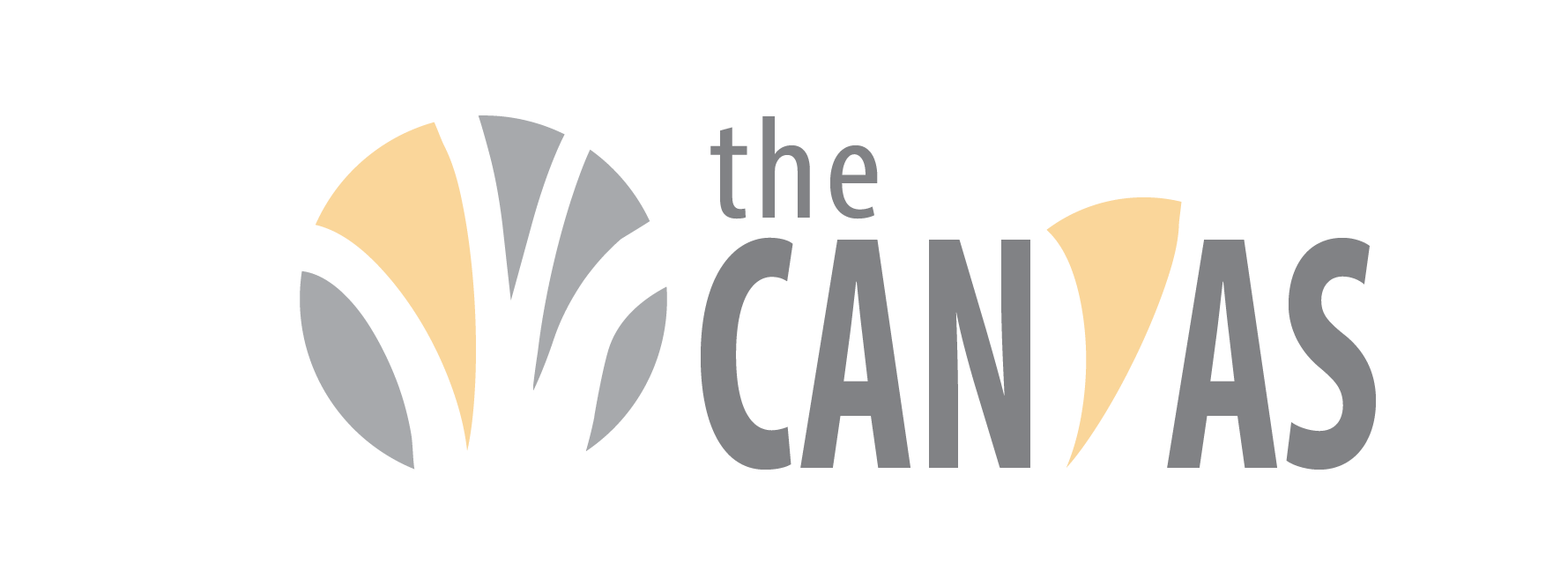

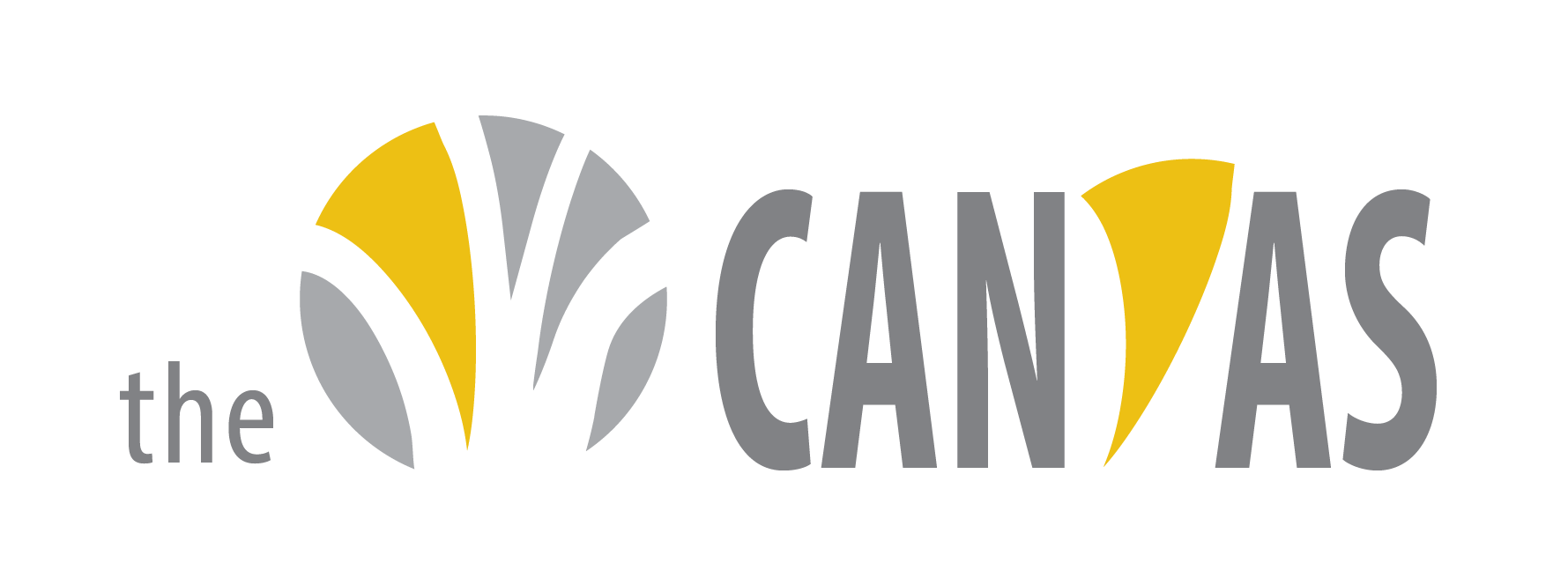
Your Comments :